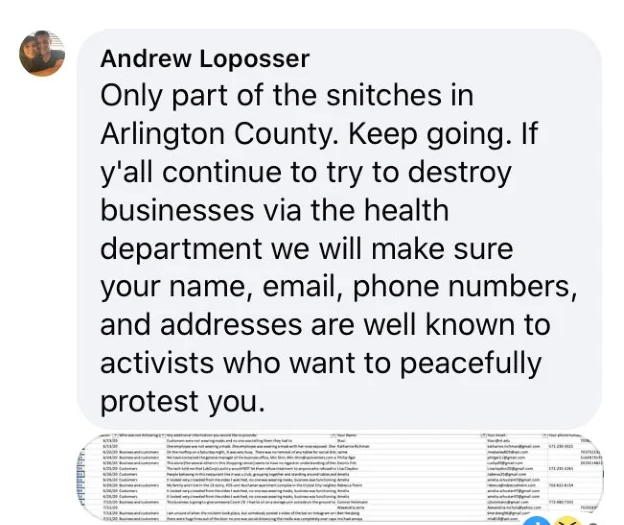The chairman of a local Republican Party committee in Arlington, Virginia, was banned from a Facebook group focused on the coronavirus in the community because he posted the names and contact information of people who complained to the government about businesses not enforcing coronavirus restrictions, such as wearing masks.
Andrew Loposser, who has been chairman of the Arlington Republicans since 2018 and is president of APL Consulting, exposed the people in a comment on a post in the more than 1,200-member Facebook group “Arlington Neighbors Helping Each Other Through COVID-19.” He uploaded a screenshot of a list of people who contacted the Virginia Department of Health about a business, which he obtained through a public records search request.
“Only part of the snitches in Arlington County. Keep going,” Loposser wrote alongside the screenshot in a comment. “If y’all continue to try to destroy businesses via the health department we will make sure your name, email, phone numbers, and addresses are well known to activists who want to peacefully protest you.”

A moderator for the group subsequently banned Loposser from the Facebook group for “doxxing,” the practice of publicly publishing private, identifying information about specific people.
“We have removed and blocked the chairman of the Arlington County Republican Committee, Mr. Andrew Loposser, from Arlington Neighbors Helping Each Other Through COVID-19,” a moderator wrote. “Threatening to dox and protest members of our community who report potential violations of our public health policies, developed and enacted in response to COVID-19, in the interest of public health, is entirely unacceptable.”
Among other restrictions, Virginia Gov. Ralph Northam has issued a state mask mandate, requiring a face covering to be worn in public spaces. The Virginia Department of Health has an online form that people can fill out in order to complain about businesses not enforcing regulations such as mask-wearing.
Loposser told the Washington Examiner that he’s heard of “several small businesses” in the county that have received visits from the state health department because of the form. He said one problem with the system is that there is no way to know if the complaint is legitimate or frivolous and that the reporting system is hurting businesses struggling to reopen amid the pandemic.
“If I filed a false police report, I would get in trouble,” Loposser said. “There just needs to be some accountability.”
That’s what led him to request the information and post it as a warning in the Facebook group, which often has tense exchanges between residents.
But Loposser rejects that he “doxxed” anyone.
“I just posted a screenshot — it’s like 15 people. Some of them were definitely fake names,” Loposser said, saying that he meant the post as a warning. “If you are report people, your information is out there.”
The form does not require those who fill out a complaint to provide their names and contact information, but there is an option to do so for those who say that the state can contact them for additional information. It includes a warning that the information is subject to Freedom of Information Act requests.
On Tuesday, a lawyer for Loposser sent the Washington Post a letter because it used the word “doxes” in the headline.
“The information that Mr. Loposser posted was voluntarily submitted by individuals who were expressly informed that it was publicly available before they submitted that information. It is not private, and your headline suggesting otherwise, is false. We request a retraction, and a correction,” the letter said.
Ironically, it is Loposser who is now receiving angry phone calls, emails, and messages from strangers as a result of news stories about his post and the ban from the Facebook group.
But he doesn’t want to be let back in to the Facebook group.
“Leftists in Arlington — they don’t like any viewpoint except their own,” he said. “They think they should be able to like sit around with their computers and report businesses anonymously. … I find it humorous.”
